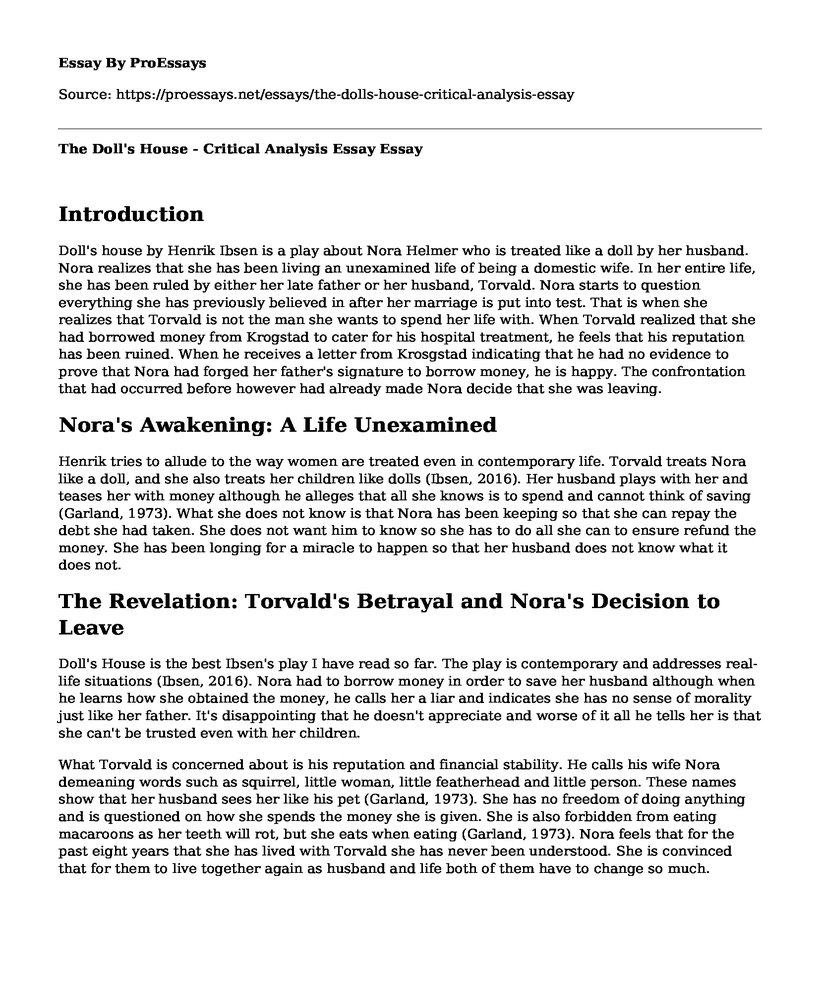Introduction
Doll's house by Henrik Ibsen is a play about Nora Helmer who is treated like a doll by her husband. Nora realizes that she has been living an unexamined life of being a domestic wife. In her entire life, she has been ruled by either her late father or her husband, Torvald. Nora starts to question everything she has previously believed in after her marriage is put into test. That is when she realizes that Torvald is not the man she wants to spend her life with. When Torvald realized that she had borrowed money from Krogstad to cater for his hospital treatment, he feels that his reputation has been ruined. When he receives a letter from Krosgstad indicating that he had no evidence to prove that Nora had forged her father's signature to borrow money, he is happy. The confrontation that had occurred before however had already made Nora decide that she was leaving.
Nora's Awakening: A Life Unexamined
Henrik tries to allude to the way women are treated even in contemporary life. Torvald treats Nora like a doll, and she also treats her children like dolls (Ibsen, 2016). Her husband plays with her and teases her with money although he alleges that all she knows is to spend and cannot think of saving (Garland, 1973). What she does not know is that Nora has been keeping so that she can repay the debt she had taken. She does not want him to know so she has to do all she can to ensure refund the money. She has been longing for a miracle to happen so that her husband does not know what it does not.
The Revelation: Torvald's Betrayal and Nora's Decision to Leave
Doll's House is the best Ibsen's play I have read so far. The play is contemporary and addresses real-life situations (Ibsen, 2016). Nora had to borrow money in order to save her husband although when he learns how she obtained the money, he calls her a liar and indicates she has no sense of morality just like her father. It's disappointing that he doesn't appreciate and worse of it all he tells her is that she can't be trusted even with her children.
What Torvald is concerned about is his reputation and financial stability. He calls his wife Nora demeaning words such as squirrel, little woman, little featherhead and little person. These names show that her husband sees her like his pet (Garland, 1973). She has no freedom of doing anything and is questioned on how she spends the money she is given. She is also forbidden from eating macaroons as her teeth will rot, but she eats when eating (Garland, 1973). Nora feels that for the past eight years that she has lived with Torvald she has never been understood. She is convinced that for them to live together again as husband and life both of them have to change so much.
Conclusion
The play is significant in showing the role of women in society. She should be a good wife and a good mother. She has, however, another obligation which is to find herself that is why she decides to leave. She wants to stand on her own feet and does not want the support of her husband. The play is worth a read and can be beneficial to genre students. The author has used literary elements such as symbolism.
References
Garland, P. E. (Director). (1973). A Doll's House [Motion Picture].
Ibsen, H. (2016). A Doll's House and Other Plays: With Pillars of the Community, Ghosts and An Enemy of the People. Penguin Books.
Cite this page
The Doll's House - Critical Analysis Essay. (2022, Nov 08). Retrieved from https://proessays.net/essays/the-dolls-house-critical-analysis-essay
If you are the original author of this essay and no longer wish to have it published on the ProEssays website, please click below to request its removal:
- Deconstruction and Postmodernism Approach to Case Study: A Doll's House
- Just Mercy Book Review
- The Relationship Between William Shakespeare's Life and His Work Essay
- The Grapes of Wrath Chapters Analysis Paper Example
- Literary Analysis Essay on Wife of Bath's Prologue and Wife of Bath's Tale by Geoffrey Chaucer
- The Doll's House - Critical Analysis Essay
- Essay Example on Two Teens, Uncertain Death: Love, Life and The Fault in Our Stars







